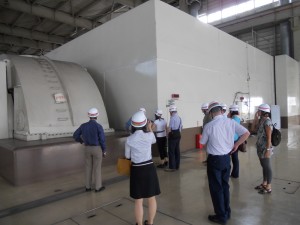 Interaction between local government in Japan and their partners overseas has evolved through time, but has largely been based upon sister-city relationships. Recently, CLAIR’s focus of that interaction has shifted from exchange, to cooperation-based projects.
Interaction between local government in Japan and their partners overseas has evolved through time, but has largely been based upon sister-city relationships. Recently, CLAIR’s focus of that interaction has shifted from exchange, to cooperation-based projects.
Local authorities are a significant resource of know-how that can be harnessed to assist their counterparts around the world. CLAIR has several projects with this aim in mind, including the Specialist Dispatch Project and the LGOTP. Each project’s main goal is to build human capital, with focus on building relationships with developing nations’ local government.
Both CLAIR and the Ministry of Internal Affairs and Communications work actively to achieve these ends by providing administrative and financial support for local authorities that invite overseas public sector officials to study in Japan under the LGOTP.
Trainees are placed with prefectural and municipal local governments, and study a range of topics from administration, environmental protection, education and agriculture. The project has received widespread acclaim for promoting regional development both within Japan and overseas.
The project aims to place overseas local government officials with Japanese local governments that have a specific area of expertise required by the trainee’s home government. Furthermore, to promote the international relations policies of the host government, each host local government takes responsibility for its own training program for a training period of between six and twelve months. For funding and expenses each host authority pays for the trainee’s return airfare, accommodation and living expenses, training fees, and domestic travel. Funding is provided from the central government through regular subsidy disbursement procedures.
Some examples of projects have included technology transfer, promoting regional development through tourism and social policy. Trainees from Kota Bharu, Malaysia studied agriculture at their sister-city of Kasaoka, Okayama Prefecture (Japanese link). After studying agricultural mechanisation, product development and low-impact farming, they returned home to promote these techniques in their home city in order to improve the agricultural productivity of local farmers.
As a major spa-resort that aims to put itself on the international tourist map, Noboribetsu (Japanese link) is trying hard to appeal to international visitors. Chinese trainees from counterpart local government bodies became part of the team formulating strategy to attract Chinese tourists. These trainees often have a ‘goodwill ambassador’ for their host cities upon return to their home countries, continuing to promote the city in China.
Gunma Prefecture is home to a large population of Brazilian immigrant workers who were disproportionately affected by the global financial crisis in 2008. Gunma has implemented programmes to support disadvantaged Brazilian children at school, focusing on upon counseling. Brazilian trainees studied these issues and analysed Gunma’s efforts to create a harmonious multicultural society.
Participants are current employees of an overseas local government and have a working knowledge of English or Japanese. They also have the potential to act as future leaders in their local community. Trainee recruitment, selection and placement are decided by CLAIR and the Ministry of Internal Affairs and Communications, who recruit and select suitable candidates for placement with local governments that indicate a desire to host a trainee. CLAIR also provides support to local governments that wish to recruit a candidate directly through their sister city.
Work conditions regarding such things as hours and holidays must conform to the work practices of the host local government. Details of how to run the training program are left to the discretion of each host local government. CLAIR cooperates with host local governments and the Ministry of Internal Affairs and Communications to provide Preliminary Training:
Tokyo Orientation, Language training,
Japanese language skills are essential for the trainees` experience to be a success. Participants are given intensive language training for between four and six weeks at a training facility called JIAM in central Japan. Lectures on Japanese culture and local government are also provided.
Specialised Training
Trainees then travel to their respective host local governments to concentrate on their main area of study. Over a period of six to eleven months, trainees undertake training in a specific area of expertise as arranged by their host local government.

